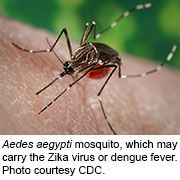
The mosquito species that’s the main carrier of the Zika virus might also transmit two other viruses — chikungunya and dengue — in a single bite, researchers report.
“A mosquito, in theory, could give you multiple viruses at once,” said Claudia Ruckert, a postdoctoral researcher at Colorado State University.
The findings about the Aedes aegypti mosquito may help improve understanding of what is called coinfection, which may be fairly common in areas with mosquito-borne disease outbreaks.
But, while the researchers found that mosquitoes in the lab can transmit all three viruses at once, they said this is probably extremely rare in nature.
“Dual infections in humans, however, are fairly common, or more common than we would have thought,” said Ruckert, who specializes in arthropod-borne and infectious diseases.
The effects of coinfection are unclear, and there is “no strong evidence that coinfection of humans results in infections that are clinically more severe,” Ruckert said in a university news release.
It’s also likely that there is significant underdiagnosis of coinfections.
“Depending on what diagnostics are used, and depending on what the clinicians think, they might not notice there’s another virus,” Ruckert said. “It could definitely lead to misinterpretation of disease severity.”
The researchers hope to learn more about what happens when mosquitoes are infected with multiple viruses.
“We will study how these virus-mosquito interactions change when there are two viruses, what gets transmitted from a coinfected mosquito, and how that differs from a mosquito infected with one virus,” Ruckert said.
The study was published May 19 in the journal Nature Communications.
Zika virus often causes flu-like symptoms. However, babies exposed to Zika in the womb can develop serious birth defects.
Symptoms of dengue and chikungunya viruses are similar to those of Zika, and can also include joint and bone pain, nose or gum bleeding and bruising, the researchers noted.
The virus-transmitting Aedes aegypti mosquitoes thrive in subtropical, tropical and some temperate regions.
More information
The World Health Organization has more on mosquito-borne diseases.
Source: HealthDay

Leave a Reply